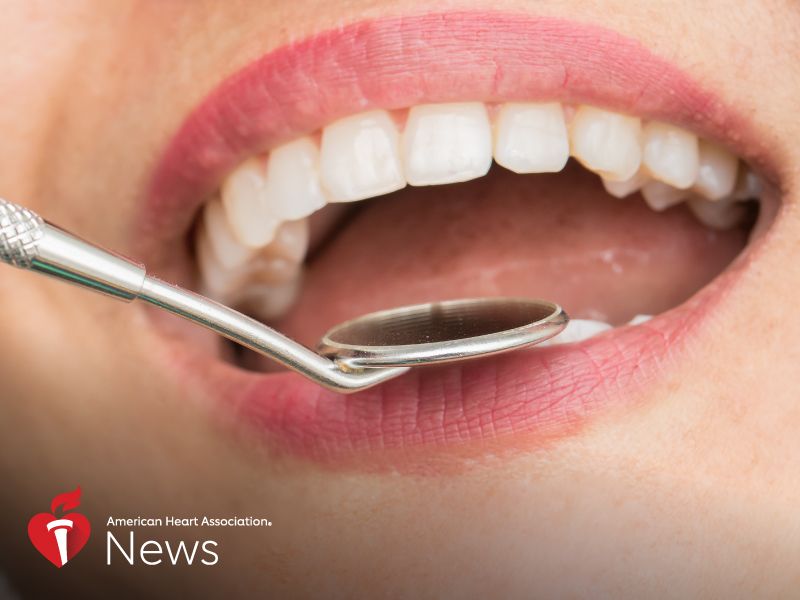Dr. Bob's Mouthly Report
Researchers Detect Mouth Bacteria In Stroke Patients’ Brains
by Robert Glisci, DDS, PC on 05/24/19

Bacteria commonly seen in the mouth has been found in the brains of people who have had a stroke, a new study shows.
The Finnish research group behind the new findings has been studying a possible association between bacterial infections and cardiovascular disease for more than 10 years. Their study, published May 23 in the Journal of the American Heart Association, looked for signs of bacteria in blood clots removed from 75 patients who were treated for an ischemic stroke at Tampere University Hospital in Finland between 2013 and 2017.
Ischemic stroke is caused by a blockage in a blood vessel in the brain. It accounts for about 87% of all strokes.
The study found that 84% of the participants, or 63 of them, had bacterial DNA in their blood clot. Among them, 59 had a strain of streptococci commonly found in the mouth that can cause infections if they get into the bloodstream.
The work is "the first to show common presence of [this] bacterial DNA in ischemic stroke patients," said Olli Patrakka, the study's lead author.
The bacteria involved, called viridans streptococci, are believed to cause endocarditis, an infection of the lining, valves or muscles of the heart.
Read more at HealthDay
Dawn to Sunset Fasting For 30 Days May Improve Insulin Resistance
by Robert Glisci, DDS, PC on 05/24/19

A study, based on the fasting practices of Ramadan, has helped investigators identify a potential new treatment for obesity-related conditions.
The study, which was presented at Digestive Disease Week 2019, found that dawn to sunset fasting for 30 days increased levels of proteins that play a crucial role in improving insulin resistance and protecting against the risks from a high-fat, high-sugar diet.
“Feeding and fasting can significantly impact how the body makes and uses proteins that are critical to decreasing insulin resistance and maintaining a healthy body weight. Therefore, the timing of and duration between meals could be important factors to consider for people struggling with obesity-related conditions,” explained Ayse Leyla Mindikoglu, MD, MPH, lead author of the study and associate professor of medicine and surgery at Baylor College of Medicine.
Read more at MDMagazine
Comcast is working on an in-home device to track people’s health
by Robert Glisci, DDS, PC on 05/24/19

Comcast is working on an in-home device to monitor people’s health, and aims to begin pilot-testing it later this year.
The device will monitor people’s basic health metrics using ambient sensors, with a focus on whether someone is making frequent trips to the bathroom or spending more time than usual in bed. Comcast is also building tools for detecting falls, which are common and potentially fatal for seniors, the people said.
Comcast plans to offer the device and related service to at-risk people, including seniors and people with disabilities, but the timing, pricing and roll-out plan have not been finalized. It will start to experiment with pilots, which are not limited to Comcast customers, by the end of 2019, with potential commercial release in 2020.
Unlike most home speakers, the device won’t be positioned as a communications or assistant tool, and won’t be able to do things like search the web or turn lights on and off. But it will have a personality like Alexa and it will be able to make emergency phone calls in the case of a health event, the people said.
Read more at CNBC
Heart disease deaths in middle-aged women on the rise
by Robert Glisci, DDS, PC on 05/24/19

A rise in risk factors like obesity along with the high cost of health care and insurance may play a role.
Death rates from heart disease are rising for middle-aged adults — white women, in particular — according to a report released Wednesday by the Centers for Disease Control and Prevention.
The increase comes after more than a decade of decreasing death rates from heart disease for this age group. In fact, for other age groups — namely, those 20 to 44, and 65 and up — heart disease death rates did not increase.
Middle-aged adults are “losing ground,” said Dr. Sharonne Hayes, a cardiologist at the Mayo Clinic in Minnesota, who was not involved with the CDC report. And this is not the first time such findings have been reported; there have been hints for years.
“We’ve got to stop patting ourselves on the back” about the decreasing rates of heart disease deaths, Hayes told NBC News. “We’ve taken our feet off the gas pedal.”
Read more at NBC News
The Five Best and Five Worst States for Healthcare
by Robert Glisci, DDS, PC on 05/24/19
Few factors bear as heavily on the well-being of any state’s citizens as their overall quality of health. In evaluating the Best States for health care, access to preventative medical and dental treatment for children and adults alike is a key consideration. The measure has been politically controversial since its inception, and the Republican-run Congress and President Donald Trump have vowed to repeal Obamacare. A rollback of the law's mandate that everyone have coverage – either through employers or public health care programs – or pay a tax penalty passed in late 2017, posing challenges to millions who have found insurance under the law.
Hawaii is the top state for health care. It’s followed by Massachusetts, Connecticut, Washington and Rhode Island to round out the top five.
Explore more about the best state for health care at Read more at USNews